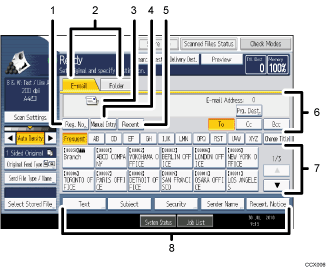


  |  | ||
This section explains the screen layout when sending scan files by e-mail.
The function items displayed serve as selector keys. You can select or specify an item by pressing it.
When you select or specify an item on the display panel, it is highlighted like ![]() . Keys that cannot be selected appear like
. Keys that cannot be selected appear like ![]() .
.

[Reg. No.]
Press this key to specify the destination using a five-digit registration number.
E-mail / Folder
Press these tabs to switch between the E-mail screen and Scan to Folder screen.
Switch the screen also when sending the same files by both e-mail and Scan to Folder.
E-mail icon
Indicates that the E-mail screen is displayed.
[Manual Entry]
To specify destinations not registered in the address book, press this key, and then enter the e-mail addresses using the soft keyboard that appears.
[Recent]
Press this key to select destinations that have been recently specified using [Manual Entry]. If there are multiple recent destinations, press [![]() ] or [
] or [![]() ] to scroll through them.
] to scroll through them.
Destination field
The specified destination appears. If more than one destination has been specified, press [![]() ] or [
] or [![]() ] to scroll through the destinations.
] to scroll through the destinations.
Destination List
The list of destinations registered in the machine appears. If all of the destinations cannot be displayed, press [![]() ] or [
] or [![]() ] to switch the screen.
] to switch the screen.
The (![]() ) symbol indicates a group destination.
) symbol indicates a group destination.
The (![]() or
or ![]() ) symbol indicates a destination that can receive encrypted e-mail.
) symbol indicates a destination that can receive encrypted e-mail.
[Text] [Subject] [Security] [Sender Name] [Recept. Notice]
Enter the message and specify the subject, security (encryption and a signature), sender, and whether or not to use Message Disposition Notification.